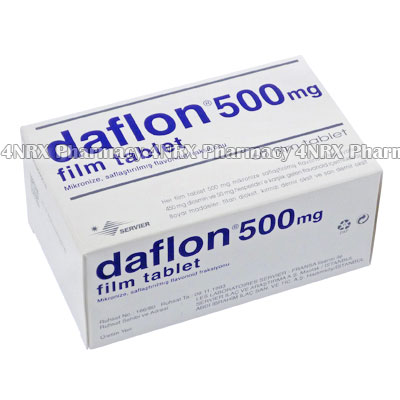 |
Home  General Health General Health  Daflon (Diosmin/Hesperidin) Daflon (Diosmin/Hesperidin) |
|
|||||||||
|
|
Daflon (Diosmin/Hesperidin)
What is Daflon (Diosmin/Hesperidin) used for? This medication is manufactured in Turkey. Daflon (Diosmin/Hesperidin) is a flavanoid medication used to treat chronic haemorrhoids. It constricts blood vessels in the body to relieve symptoms such as irritation, redness, swelling, or pain. This action also makes it useful for treating varicose veins, swelling of the lymph nodes after surgery, or leg ulcers. Your doctor may prescribe it to treat other unlisted conditions, as well. How should I use Daflon (Diosmin/Hesperidin)? Daflon (Diosmin/Hesperidin) is typically taken once daily at a dosage of one tablet, but your particular instructions will depend on the severity of your symptoms and your current health condition. Swallow the doses whole with a large glass of water to aid absorption. Never split, crush, or chew the tablets before use to prevent destroying or changing the effects of their contents. If you have any questions about the medication, ask your pharmacist or doctor to prevent any potential problems. What are the side effects of Daflon (Diosmin/Hesperidin)? When used correctly, Daflon (Diosmin/Hesperidin) will not cause side effects in most patients. Inform your doctor immediately if you do experience any symptoms that worry you or are intense to make sure the correct adjustments are made to prevent more problems from occurring. Please Note Strictly use Daflon (Diosmin/Hesperidin) as prescribed and follow all instructions provided by your doctor. Safe, suitable, and optimum dosage can vary and is dependent on the patient`s health and medical history, as well as the condition you are treating. Daflon (Diosmin/Hesperidin) may not be safe or suitable for all patients. Always ensure your doctor is informed if you are pregnant or breastfeeding, using any other type of medication (including non-prescription medicine, vitamins, and supplements), as well as if you have any allergies, other illnesses, or pre-existing medication conditions. Seek immediate medical attention or proceed to your nearest accident and emergency department if you suffer a hypersensitive or allergic reaction. Symptoms usually present during a reaction of this nature include difficulty breathing or swallowing, swelling of the limbs or face, tight chest, hives, and skin rashes. 
|
||||||||||||||||||